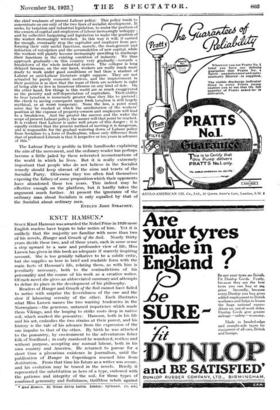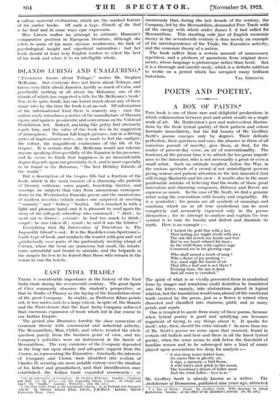KNUT HAMSUN.*
SINCE Knut Hamsun was awarded the Nobel Prize in 1920 more English readers have begun to take notice of him. Yet it is unlikely that the majority are familiar with more than two of his novels, Hunger and Growth of the Soil. Nearly thirty years divide these two, and of those years, each in some sense a step upward to a sane and profounder view of life, Miss Larsen has given in this book an adequate if scarcely inspiring account. She is too genially talkative to be a subtle critic, but she supplies us here in brief and readable form with the main facts of Hamsun's life, relating them, as with him is peculiarly necessary, both to the contradictions of his personality and the course of his work as a creative writer. Of each novel she gives an abbreviated summary and attempts to define its place in the development of his philosophy.
Readers of Hunger and Growth of the Soil cannot have failed to notice with surprise the feverishness of the one and the slow if labouring serenity of the other. Each illustrates what Miss Larsen names the two warring tendencies in the Norwegians—the generous, untamed impatience which made them Vikings, and the longing to strike roots deep in native soil, which marked the peasantry. Hamsun, both in his life and his art, embodies the two strains at their purest, and his history is the tale of his advance from the expression of the one impulse to that of the other. By birth he was attached to the peasantry, by environment to the adventurous fisher folk of Nordland ; in early manhood he wandered, restless and without purpose, accepting any manual labour, both in his own country and America. He returned to pursue for a short time a piecarious existence in journalism, until the publication of Hunger in Copenhagen rescued him from destitution. From that time his future as a writer was secure, and his evolution may be traced in the novels. Briefly it represented the substitution as hero of a type, endowed with the patience and integrity of the soil, for those types of combined generosity and foolishness, thriftless rebels against
• Emil Batmen. By Banns Astro Lulea London: Oyldendal, [55. not.]
a callous material civilization, which are the marked feature of his earlier books. Of such a type, Growth of the Soil is his final and in some ways epic expression.
Miss Larsen makes no attempt to estimate Hamsun's comparative position in European literature, although she refers to some of his more obvious weaknesses, his lack of psychological insight and superficial naturalism ; but her book should at least help English readers to select the best of his work and relate it to an intelligible whole.



















































 Previous page
Previous page